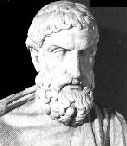|
|
| Funding for this site is provided by readers like you. | |
|
|
|
|
|||||
|
|
|||||||
|
|
|
|
|
|
|
|
In the course of history there have been many philosophies based on seeking that which is pleasurable and avoiding that which is not. The term “hedonism” is often used to denote these moral systems based on seeking pleasure and avoiding suffering.  For
hedonist philosophers, the quest for pleasure necessarily implies
the quest for happiness. The ancient Greek philosopher Epicurus is
certainly the most famous representative of this school of thought.
Epicurus stressed the importance of fulfilling our pleasures in a
simple way and avoiding excess. Contrary to the way people commonly
understand the term “epicureanism” today, the real Epicureans
lived in the greatest simplicity, avoiding luxury and worldly pleasures. For
hedonist philosophers, the quest for pleasure necessarily implies
the quest for happiness. The ancient Greek philosopher Epicurus is
certainly the most famous representative of this school of thought.
Epicurus stressed the importance of fulfilling our pleasures in a
simple way and avoiding excess. Contrary to the way people commonly
understand the term “epicureanism” today, the real Epicureans
lived in the greatest simplicity, avoiding luxury and worldly pleasures. For them, happiness was found in the simple things of life, such as good meals and good friends. The desire for wealth or prestige was regarded as the result of social conditioning and something to be avoided, because it usually brought more harm than good. The hedonist philosophy was fought bitterly by theologians and vilified throughout the Middle Ages. It did not really resurface until the 17th and 18th centuries, through the sensualist morality of philosophers such as Locke, Hume, and Diderot. |
|
||||||||||||||||||||||||||||||||||||||||||||||||
| |
|
|
|
|
|
|
|
|




